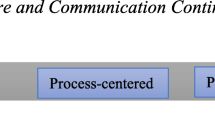Abstract
The passage from a posture of clinician to that of clinician–bioethicist poses significant challenges for health professionals, most notably with regards to theoretical or epistemological views of complex ethical impasses encountered in clinical settings. Apprehending these situations from the only clinical perspective of the nurse or the doctor, for example, can be very unproductive to help solve this kind of situation and certainly poses great limits to the role of the clinician–bioethicist. Drawing on my own experience as a former nurse who, following graduate studies in bioethics has begun providing ethics consultation services, I argue that clinicians must undergo an epistemological transformation in order to become clinician–bioethicists. A source of inspiration or framework for would-be clinician–bioethicists is, I suggest, the “Petite éthique” developed by the contemporary French philosopher Paul Ricoeur. Specifically, clinician–bioethicists should develop specific core ethical competencies (in line with the conclusions of the American Society for Bioethics and Humanities (Core competencies for health care ethics consultation, 1998); namely: savoir or knowing, savoir faire or knowing how to do, and savoir être or knowing how to be.
Similar content being viewed by others
Notes
This experience happened at the beginning of a clinical ethics mentorship with a senior clinical ethicist, and took place in three different health care institutions in which I was involved for more than a year and a half.
References
American Society for Bioethics and Humanities (ASBH). (1998). Core competencies for health care ethics consultation [online]. Available www.asbh.org/publications/core.html. Accessed 12 March 2009.
Bouthillier, M. E. (2006). Santé publique, réduction des méfaits et travail de proximité: les problèmes éthiques d’intervenants montréalais. Thesis, Montreal University, Montreal.
Doucet, H. (2008). Faut-il toujours alimenter une personne malade? In Soigner en centre d’hébergement: repères éthiques (pp. 41–62). Montréal: Fides.
Ford, P. J., & Dudzinski, D. M. (Eds.). (2008). Complex ethics consultations: Cases that haunt us. Cambridge: Cambridge University Press.
Gadow, S. (1980). Existential advocacy: Philosophical foundations of nursing. In S. G. Spicker (Ed.), Nursing image and ideals (pp. 79–101). New York: Springer Publishing.
Graig, D., & Winslow, G. R. (2008). When the patient refuses to eat. In P. J. Ford & D. M. Dudzinski (Eds.), Complex ethics consultations: Cases that haunt us. Cambridge: Cambridge University Press.
Keating, B. (2008). L’alimentation et l’hydratation artificielles des patients en état végétatif permanent: la discussion américaine et les interventions romaines récentes. Laval théologique et philosophique, 64(2), 485–525.
MacDonald, H. (2007). Relational ethics and advocacy in nursing: Literature review. Journal of Advanced Nursing, 57(2), 119–126.
Michel, J., & Ricoeur, P. (2006). Une philosophie de l’agir humain. Paris: Éditions du Cerf.
Murphy, N., & Aquino-Russel, C. (2008). Nurses practice beyond simple advocacy to engage in relational narratives: Expanding opportunities for persons to influence the public space. The Open Nursing Journal, 2, 40–47.
Nickel, J. (2006). Human rights. In Stanford encyclopedia of philosophy. Stanford: Stanford University Press.
Pedersen, K. L. (2005). Narrated experience from the clinical instructor as “a judge” when giving the nurse student a failing grade for the clinical course—An analysis based on the text theory of Paul Ricoeur. Nordic Journal of Nursing Research & Clinical Studies/Vordi Norden, 25(2), 21–25.
Qualtere-Burcher, P., & Qualtere-Burcher, P. (2009). The just distance: Narrativity, singularity, and relationality as the source of a new biomedical principle. Journal of Clinical Ethics, 20(4), 299–309.
Ricoeur, P. (1990). Soi-même comme un autre. Paris: L'Ordre Philosophique, Éditions du Seuil.
Ricoeur, P. (1995). Réflexion faite: Autobiographie intellectuelle. Paris: Éditions Esprit.
Ricoeur, P. (2001a). Le Juste 2. Paris: Éditions Esprits.
Ricoeur, P. (2001b). Les trois niveaux du jugement médical. In Le Juste 2 (pp. 227–244). Paris: Éditions Esprit.
Sitvast, J. E., Abma, T. A., Widdershoven, G. A. M., & Lendemeijer, H. H. G. (2008). Photo stories, Ricoeur, and experiences from practice: A hermeneutic dialogue. Advances in Nursing Science, 31(3), 268–279.
Sorlie, V., Kihlgren, A., & Kihlgren, M. (2005). Meeting ethical challenges in acute nursing care as narrated by registered nurses. Nursing Ethics, 12(2), 133–142.
Thacker, K. S. (2008). Nurses’ advocacy behaviors in end-of-life nursing care. Nursing Ethics, 15(2), 174–185.
Welchman, J., & Griener, G. G. (2005). Patient advocacy and professional associations: Individual and collective responsibilities. Nursing Ethics, 12(3), 296–304.
Acknowledgments
I would like to express gratitude to Dr. Bryn Williams-Jones for his in depth revision, comments, support and discussion that have improved this manuscript over the course of its development. I also would like to thank Dr. Marie-Ève Bouthillier for her feedback on a preliminary version of this paper and for the opportunity of rich discussions about clinical practice. I finally would like to thank Jocelyne Chicoine for all her editorial support throughout the process.
Author information
Authors and Affiliations
Corresponding author
Rights and permissions
About this article
Cite this article
Potvin, MJ. Ricoeur’s “Petite éthique”: An Ethical Epistemological Perspective for Clinician–Bioethicists. HEC Forum 22, 311–326 (2010). https://doi.org/10.1007/s10730-010-9146-1
Published:
Issue Date:
DOI: https://doi.org/10.1007/s10730-010-9146-1




